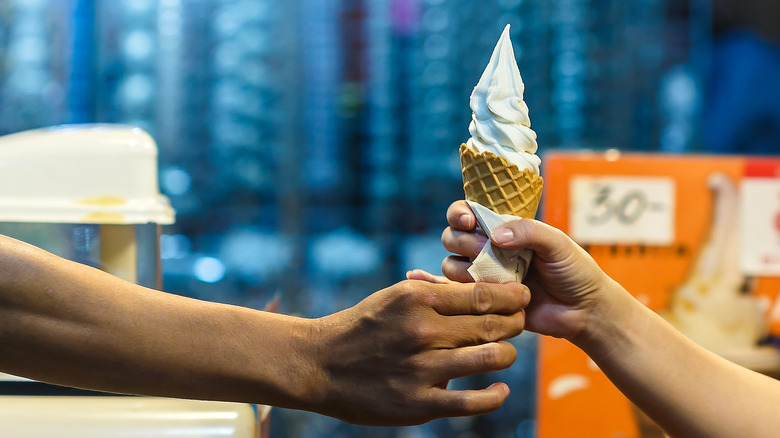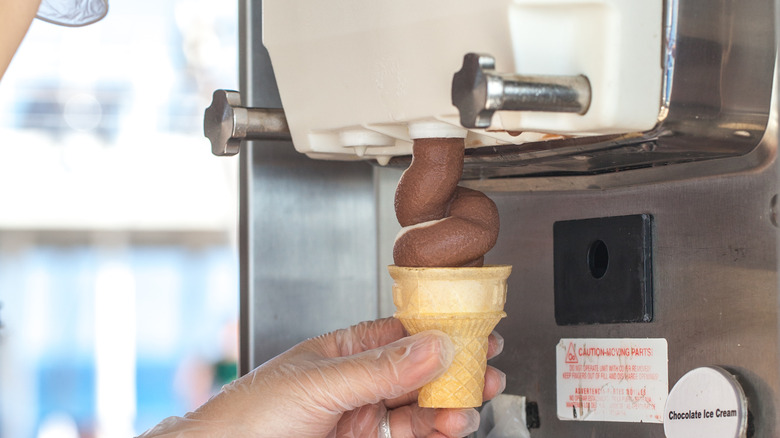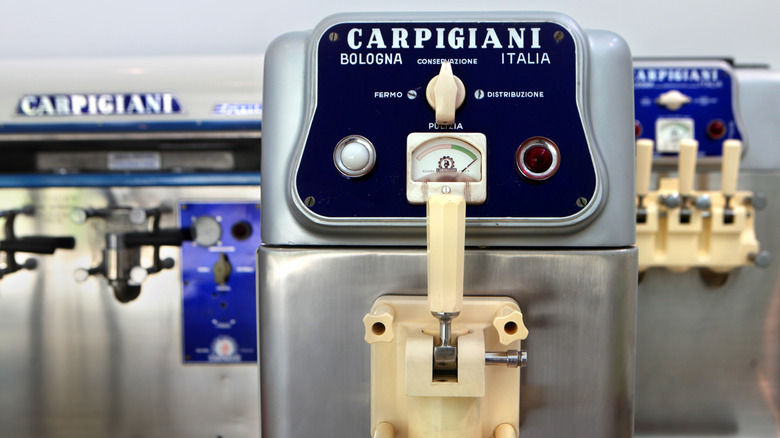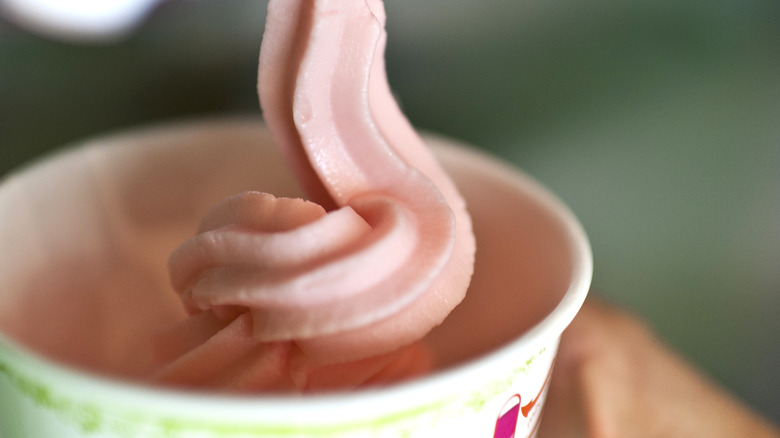Soft Serve Ice Cream Is A Nightmare For Fast Food Safety
Ice cream really hits the spot, especially on a hot summer day. The creamy and cool treat is simple, delicious, and relatively inexpensive. It even makes a delicious cake when melted and added to the batter. But before you enjoy your next cone of soft serve, however, you might want to think twice.
Guidelines surrounding how often ice cream machines should be cleaned vary from state to state, and many agencies recommend cleaning and sanitizing soft serve machines every day. In addition to the machines needing to be cleaned often, the mixture needs to be kept at a very specific temperature to prevent the growth of bacteria. This presents a challenge for fast food restaurants in that it's time-consuming and costly to properly run soft serve machines. It's not something to be taken lightly, either. When machines aren't properly taken care of, the ice cream can harbor bacteria that can lead to foodborne illness.
Ice cream machines need to be cleaned daily
Although many manufacturers' guidelines state that soft serve machines need to be cleaned every 24 hours, the sad reality is that many businesses clean their machines much less frequently, which can result in foodborne illness due to contamination from staphylococcus, listeria, and other bacteria.
There are a few reasons businesses don't clean their machines as often as is recommended, but one of the main reasons is that it's a tedious and time-consuming process. To properly clean a soft-serve ice cream machine, the machine needs to be shut down, emptied, and partially disassembled, which can include dozens of small parts like screws, paddles, and rubber O-rings, depending on the model of the machine. Some pieces are removed and then washed and sanitized separately; others need to be cleaned and sanitized in place. Altogether, this process typically takes at least an hour to thoroughly clean and sanitize a machine or even longer for fancier or more finicky machines.
That time is a lot of lost business if done during business hours. On the other hand, it would require paying an employee extra to clean after-hours if not done during business hours. On the bright side, this may be one of the reasons McDonald's ice cream machines always seem to be broken; it could be that your local McDonald's takes soft-serve machine sanitization seriously, and is actually undertaking the tedious (but important) task of cleaning their machine.
To make this process even more difficult, employees also need to be trained on proper cleaning and sanitation processes; if this doesn't happen, the machines could still be harboring bacteria even with regular cleanings.
Soft-serve machines must be kept at just right temperature
On top of needing regular cleanings to prevent bacteria growth, the process of making the ice cream also makes soft-serve machines the perfect environment for mold and bacteria to grow in part. There is a small temperature window, in which restaurants can safely serve and store soft-serve ice cream. The soft-serve mixture needs to be stored under 40 degrees Fahrenheit to prevent the growth of bacteria. In fact, because it is sometimes unpasteurized, the mixture should be stored as close to freezing as possible, according to the Vermont Food Safety & Consumer Protection Division.
However, as soft serve ice cream moves through the machine, it does so at temperatures above freezing. If the temperature reaches 40 degrees Fahrenheit or above, it enters what food safety agencies call the "Danger Zone" or the temperature range between 40 and 140 degrees Fahrenheit, in which listeria and other bacteria can multiply. This is why cleaning, sanitization, and daily machine inspection are so essential.
What can happen if a soft-serve machine isn't properly maintained
Considering the strict rules that must be followed to maintain the cleanliness and temperature of these machines, it's no surprise that soft-serve ice cream has been linked to numerous foodborne illness outbreaks, including two listeria outbreaks in August 2023. One, which The Centers for Disease Control and Prevention traced back to "Soft Serve on the Go" ice cream cups, resulted in two illnesses and two hospitalizations in Brooklyn, NY. The other, which the Department of Health traced back to improperly cleaned ice cream machines at a family restaurant, killed three individuals and hospitalized six more in Tacoma, Wash. Stories like these are the reason doctors recommend pregnant women refrain from eating soft-serve ice cream altogether since so many machines aren't cleaned properly. It presents too high of a risk of contamination with listeria, which can be devastating for an unborn baby.
Before enjoying your next cone of soft serve, it's a good idea to ask the business about their cleaning and sanitization practices. To be safe, only buy soft serve from a business that cleans their machines at least every 24 hours. If you want to be extra cautious, you can also buy your own ice cream maker and enjoy the treat at home.



